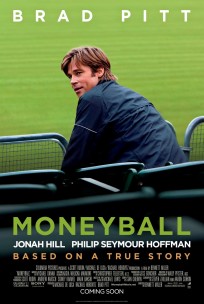
c/o onlinemovieshut.com
“Moneyball” is a good movie. Emphasis on the “good.” I would be lying to myself if I called it great along with every other critic out there. Unlike some critics, I can’t see this film going very far in the Oscar race. It’s a well crafted script that contains just as many strong moments as it does weak ones. The story has a strong backing but it sometimes fails to meet our expectations, and in a movie like this, that’s what matters most.
Brad Pitt headlines the show as the Oakland Athletics General Manager Billy Beane. I’ve always appreciated Brad Pitt’s work. He’s a great actor who has opportunities to star in big blockbusters whenever he wants and then to switch gears completely to act in more diverse films such as “Inglourious Basterds” and “Tree of Life.” Pitt was not the best choice for this role but not because he does a bad job. He’s fantastic. He gives us great insight into Beane’s life, but he rarely shows any of the real anger and pain he’s being forced through. Needless to say, it didn’t work out for the guy. Someone told me that Brad Pitt and Billy Beane are essentially the same person. I don’t want to see Brad Pitt playing himself. I want to see Pitt as a manifestation of Billy Beane. His take on the man.
For those of you not familiar with the story based on the extremely popular book, the Oakland Athletics were a struggling team in 2001. They had just lost their chance to advance to the playoffs in a game against the Yankees and their three major stars (Jason Giambi, Johnny Damon, and Jason Isringhausen) were being picked up by other teams. The major problem is that the Yankees were able to sign Giambi to a seven year $120 million contract while the Athletics only had $41 million in salaries for the entire 2002 season. Players had to pay for their own fountain drinks in the vending machine. Conditions were about as bad as they could get.
Enter Peter Brand (not an actual person, but a combination of multiple people from the book,) played fearlessly by Jonah Hill in one of his finer performances. Here’s where the film is on its mark. Brandt is picked up by Beane and uses his Ivy League training to calculate which free agents are most valuable to the A’s, according not to their actual strengths as players, but their ability to get on base. This leads to strange decisions around the ballclub that confuse scouts, such as the signing of catcher Scott Hatteberg as the new first baseman. Hill never cracks a real joke in this film and is a fine example of a comedian shedding the farce and wearing more of the tragic mask. Not as outstanding as his role in “Cyrus,” but still pretty damn good. Philip Seymour Hoffman also does justice to the role of A’s manager Art Howe. His stoicism makes for some of the funnier moments in the film.
There are quite a few great stories left out of the film. Key pitchers on the team are pushed aside to focus on only a few very specific players such as David Justice, an aging star who only wants to prove to the fans that he’s still got it in him. Beane’s home life is basically thrown into the dark. His daughter appears a few times to stir some emotions in Beane, but it’s mostly a one-and-done show. His wife, Sharon (Robin Wright), is given even less screen time. In fact, it might have even worked better if she just wasn’t in the film—it could use the time for actually engaging side stories.
The two strongest aspects of the film are the screenplay and the cinematography. Adapted in part by the legendary Aaron Sorkin, who won the Oscar last year for “The Social Network,” this script pulses with energy and dynamism even if the movie doesn’t always work. Wally Pfister, also an Oscar winner last year for “Inception,” controls the camera with such grace and flow that I feel like the cinematography trumped the story. The sequence in which the A’s play their final game in a potential 20 game winning streak had me on the edge of my seat.
In the end, “Moneyball” just didn’t work for me as well as I thought it would. I read a great many reviews before seeing the film and definitely had high expectations for it. My satisfaction was never really met and I walked out of the theater wondering what everyone saw in it. Many say it’s one of the best films on baseball ever made. I say it deserves its legacy somewhere between “Field of Dreams” and “Hardball.” But then again, all three of these films aren’t truly about baseball when it boils down to it.